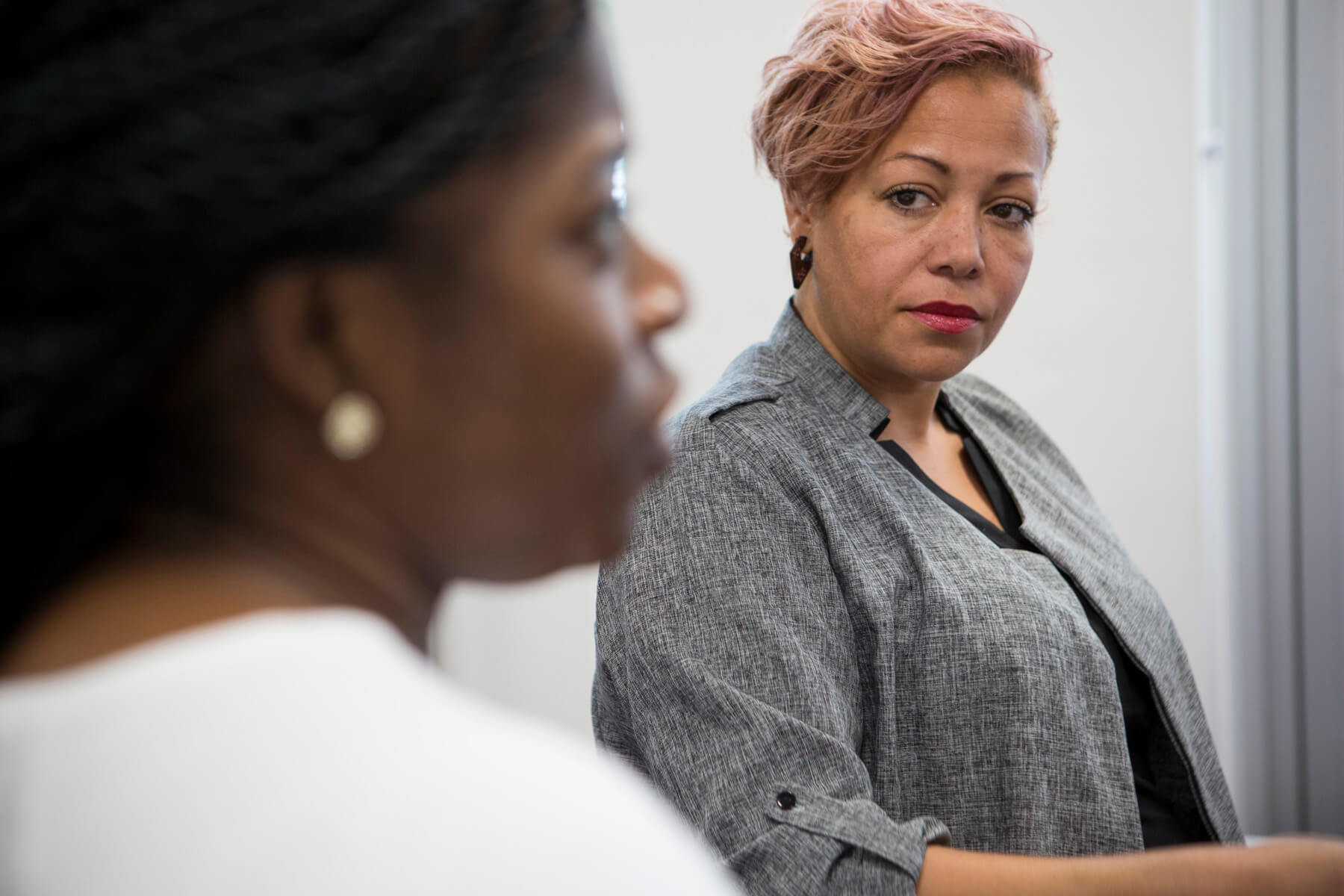
Advanced practice and research: social work and social care (D55)
Join one of the most established and respected doctoral social work and social care programmes in the UK
This course engages with the realities of your current work experience, its emotional demands and complexities and enables you to respond to these more reflectively, effectively and with increased confidence in your role.
You are supported to design and implement a research project relevant to your area of work and interest. It is uniquely arranged with other professional doctorates covering consultation and the organisation and systemic therapy, making for a multidisciplinary student body and enriching learning experience.
Please note: you may see the D55 course also referred to as SCDOTP003 in communications from our application system.
About this course
The course is comprised of two years of ‘taught’ work and a minimum of two years applied research leading to submission of a 40,000 word doctoral thesis.
In years one and two, you will attend small reflective practice seminars focusing on direct practice as well as supervision/management or education/training. You will undertake an organisational observation and engage with theory and research around the contemporary policy environment and ‘complexity’ in social work and social care.
In year one you are also required to attend a five-day group relations conference which is a unique opportunity for experiential learning about how you work in groups, systems and organisations, and how they impact upon you and your role. The cost of this event is included in the course fees.
Research methods, lectures and seminars are shared with students on other professional doctorate programmes, making for a rich interdisciplinary learning experience.
By the end of year two, you will have developed a clear proposal for your research, and in subsequent years will be regularly supervised on your project by an experienced team. Research continuation seminars offer opportunities for group data analysis and problem solving, and strong peer support.
Each year you will also attend the annual Tavistock doctoral conference where students present work in progress, display posters and learn from the experience of doctoral graduates.
Modules
Module 1: Research Methods
- Year one
- FHEQ level 8
- 30 credits
- Core module
- Module lead: To be confirmed
Module aims
The aims of the module are to:
- provide a sophisticated introduction to a range of research methodologies and research paradigms relevant to the conduct of applied professional research programmes
- introduce key debates about ontology and epistemology and the philosophical principles underpinning knowledge generation in the social and psychological sciences, with particular attention to psycho-social, systemic, and organisational applications of these principles
- through regular facilitated multi-disciplinary group sessions with other Professional Doctorate students, to enable you to reflect on your practitioner identity, research aspirations, and methodological interests and thereby begin to reflexively position yourself as an applied researcher
- consider how applied research can be utilised to develop professional practice and contribute to extending the forefront of knowledge and/or professional practice within your own area
Module assessment
You are required to submit a 5,000 word critical and analytical literature review on a selected research topic, which may or may not be what you eventually opt to research for your dissertation.
Module 2: Advanced Professional Practice 1: Clinical Social Work and Social Care
- Year one
- FHEQ level 8
- 15 credits
- Core module
- Module leader: Amina Adan
Module aims
The aims of the module are to:
- engage in a project of depth experientially led learning that develops confidence, sophistication, and reflective capacity in role as a therapeutically informed practitioner
- consolidate and develop theoretical and conceptual understanding of complex emotional and relational dynamics, and the effective management of these in role
- extend professional initiative, capacity to take authority in relation to the ‘task’, and ability to work effectively with others in conflictual, demanding, and uncertain conditions
- enable you to plan and write up a concise, analytical, and reflective account of their clinical learning and development, evidencing ability of systematic acquisition and understanding of a substantial body of applied knowledge
- better understand and engage more effectively with the demands of contemporary practice, organisational and training environments
- develop awareness of the existence and impact of oppressive forces such as racism, structural inequalities such as the impact of climate change and the impact of socio-political contexts such as poverty, within which people and organisation’s function
Module assessment
You are required to submit a 3,000nword reflective and analytical practice study, in which you describe, reflect on, and critically analyse your clinical practice, with particular attention to the use of your professional self in the process of the work.
Module 3: Advanced Professional Practice 2: Organisations and the policy process
- Year one
- FHEQ level 8
- 15 credits
- Core module
- Module lead: Anna Harvey
Module aims
The aims of the module are to:
- develop the skills of close observation of organisational and social experience and facilitate access to unconscious dimensions of organisational and social life
- develop your confidence in occupying the observational role
- provide the opportunity to take up role as a member of a Group Relations event
- enhance and develop your reflexive professional capacities in relation to your organisational and social positioning
- introduce a range of psychosocial, systemic, and psychoanalytic theory about social and organisational life, and its unconscious determinants
Module assessment
You are required to submit a 3,000 word paper describing, reflecting upon, and critically analysing your experience of an organisational observation in the light of public policy and your experience of a Group Relations Event.
Module 4: Research Methods 2
- Year two
- FHEQ level 8
- 30 credits
- Core module
- Module leads: Philip Archard and Simon Tucker
Module aims
The aims of the module are to:
- consolidate your learning from Research Methods 1 with your prior knowledge and experience in clinical and applied professional practice
- help you to think critically and reflexively about problems in order to create new solutions and new knowledge
- enable you to choose an appropriate research design and research methodology for your research questions
Module assessment
You are required to submit a 5,000 word research assignment, describing the research that will form the basis of your thesis and including a systematic literature review.
Module 5: Advanced Professional Practice 3: Supervision, Management and Education
- Year two
- FHEQ level 8
- 15 credits
- Core module
- Module lead: Louise Grant
Module aims
The aims of the module are to:
- engage in a project of depth experientially led managerial/supervisory or educational learning, that further develops confidence, sophistication, and reflective capacity within your professional role as a supervisor, manager, or educator
- formulate a clear sense of how your own deep sources of practice curiosity inform both your choices of practitioner specialism, and your intended research aims and plans
- identify the practice themes that form a central focus for your professional curiosity, and to consider how these might inform and deepen your approach to the formulation of a research protocol
- develop capacities for consultation with peers through structured seminar learning methods
- further consolidate and develop theoretical and conceptual understanding of complex emotional and relational dynamics, and the effective management of these at work
- extend professional initiative, capacity to take authority in relation to the ‘task’, and ability to work effectively with others in conflictual, demanding, and uncertain conditions
- enable you to plan and write up a concise, theoretically informed, and reflective account of your learning and development, with an emphasis on your understanding of yourself and your distinctive style of practice as an important component of the work
Module assessment
Assessment of this module comprises a poster presentation (50%) and 2,000 word reflective assignment (50%), both reflecting on learning from your practice project.
Module 6: Advanced Professional Practice 4: Complexity and psycho-social interventions
- Year two
- FHEQ level 8
- 15 credits
- Core module
- Module lead: Anna Harvey
Module aims
The aims of the module are to:
- engage in the study of a range of contemporary theory and research that addresses complexity in everyday practice and organisational settings
- develop confidence in mastering difficult conceptual frameworks in the field of applied complexity theory
- relate your direct experience of working in complex environments with complex cases and the range of reading and theory in the programme
- encourage a high level of intellectual independence in studying, analysing, critiquing and applying theoretical and research studies to professional experience
- support you in writing a concise, original and experientially grounded assignment that engages with ideas at the leading edge of modern applied social science
- enable you to relate the work of the module to your own emerging focus of research for the doctoral thesis
- through presentations in reading seminars, enable you to demonstrate the capacity for clear, articulate and critical communication of difficult ideas
- develop a complexity informed view of oppressive structures and systems and of ecological contexts
Module assessment
You are required to submit a 3,000 word theoretical case study of a complex case or organisational process from your own experience, showing evidence of a command of the key concepts learned in the module, and ability to deploy these in a discriminating and intelligent manner.
Module 7: Research Thesis
- Years three plus
- FHEQ level 8
- 240 credits
- Core module
- Module leads: Philip Archard, Amina Adan, Louise Grant and Anna Harvey
Module aims
The aims of the module are to:
- apply research skills in a real-world environment in order to complete a research project which is of some value to your field of professional practice
- implement original, relevant and purposeful research, with a sound basis achieved through integrating a review of existing literature, ontological and epistemological considerations, strategy, design and methodology appropriate to the research question
- articulate and defend the positions that you have adopted with regard to your research and successfully negotiate a viva examination based on determining the originality, reliability and validity of the research and the value to the profession
Module assessment
Assessment is through the submission and a viva examination of a thesis up to 40,000 words detailing your original research.
Who is this course for?
If you are working in the social work or social care sector, are looking for in-depth professional development and want to research a pertinent topic in a supportive and dynamic learning environment then this may be the course for you.
Course details
To undertake this course, you need to have either:
- a Master’s degree and either a social work qualification and at least two years post-qualifying experience, or
- substantial experience working in the health and social care sector.
As part of your application, you are required to submit a research proposal to the application form on MyTAP. Our research proposal template provides guidance on what to include.
Please note: you may see the D55 course also referred to as SCDOTP003 in communications from our application system.
Tuition fees
Home
£5,170 per year (2025/26)
International
£10,340 per year (2025/26)
Tuition fees are charged for each year of your course. If your course is longer than one year, the fees may be subject to annual inflationary increases. For more information on tuition fee changes, including paying for tuition fees, please refer to our tuition fee guidance.
Funding
Student loans
If you are studying a Master’s or Doctoral level course, you may be eligible for a postgraduate loan from the UK government. Please check our student loans guidance for eligible courses and criteria.
Funding for current students
We offer several funding options to support current students who need financial assistance during their studies. Please refer to our financial support guidance for more information.
Assessment
Assessment in the first two years is by written coursework. Research methods units are assessed by 5,000 word submissions, a critical literature review in year one and a research proposal in year two.
Other units are assessed by 3,000 word essays or case studies. The research phase of the programme is assessed by a 40,000-word thesis and successful completion of all these requirements leads to the award of a doctorate.
Attendance
The core attendance day is Thursday. The programme requires attendance on 14 full or half days in each of the first two years on a fortnightly basis, plus the five-day group relations conference in year one which normally runs in the week preceding Christmas week.
In the research phase, there are monthly research continuation seminars, normally on a Thursday, and individual research supervision meetings which can be organised on a more flexible basis.
There is provision for some one-to-one elements of the programme to be accessed remotely, but this needs to be negotiated. This relates to one-to-one aspects of the course only.
Teaching dates for the academic year 2025/26
The teaching schedule alternates between D55-specific teaching days and Integrated Professional Doctorate (IPD) days. On IPD teaching days, students from different courses join shared modules. Please note teaching days may be subject to change.
| Thursday 9 October 2025 | IPD teaching day |
| Thursday 23 October 2025 | D55 teaching day |
| Thursday 6 November 2025 | IPD teaching day |
| Thursday 20 November 2025 | D55 teaching day |
| Thursday 4 December 2025 | IPD teaching day |
| Thursday 8 January 2026 | IPD teaching day |
| Thursday 22 January 2026 | D55 teaching day |
| Thursday 5 February 2026 | IPD teaching day |
| Thursday 12 February 2026 | Doctoral conference |
| Thursday 26 February 2026 | D55 teaching day |
| Thursday 5 March 2026 | IPD teaching day |
| Thursday 19 March 2026 | D55 teaching day |
| Thursday 23 April 2026 | IPD teaching day |
| Thursday 7 May 2026 | D55 teaching day |
| Thursday 14 May 2026 | IPD teaching day |
| Thursday 4 June 2026 | D55 teaching day |
| Thursday 9 July 2026 | Recall day |
Graduates from this course have continued to develop their careers as practice leaders either in strategic leadership or practice leadership positions, in advanced or specialised practice roles and in education, or academia.
Why study with us?
Our social work and social care doctoral programme is among the most established and respected in the UK. We now have many successful doctoral graduates, a number of whom contribute to the teaching and learning, as well as a long established service user representative who plays an important role in the life of the course.
A high proportion of our current and past students are from Black, Asian and other minority ethnic backgrounds and many students are researching aspects of their professional experience of racism, marginalisation, migration, and discrimination, bringing to the surface aspects of lived experience that might otherwise remain relatively invisible. Our staff group is diverse and fully committed to supporting such work.
Our programme is unique in its emphasis on relationship-based and therapeutic practice principles and benefits from a course team who are experienced as well as current practitioners, leading academics and researchers.
Research supervisors are selected on the basis of their expertise in relation to your chosen area of research. There are also some opportunities to undertake supervised practice in one of the Trust’s clinical services as part of the course or to benefit from reflective supervision with clinical staff.
Our students have access to the rich programme of academic, research and multidisciplinary clinical practice learning opportunities in the Trust and events such as the Tavistock policy seminars.
Testimonials
Course facilitators
Accreditations
This course is validated by the University of Essex.
Register your interest
Applications are now closed. Register your interest and be the first to hear when this course reopens.
Recommended courses
Explore courses to study beforehand
-
 Master’s Eligible for Student Visa
Master’s Eligible for Student Visa
Social work (M23)
